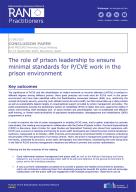Details
- Publication date
- 9 February 2024
- Author
- Directorate-General for Migration and Home Affairs
- Country
- Spain
- RAN Publications Topic
- Prison and probation
Description
The significance of P/CVE and the rehabilitation of violent extremist or terrorist offenders (VETOs) is realized to different degrees among different prisons. Many good practices and tools exist for P/CVE work in the prison environment and have been identified within the Radicalisation Awareness Network (RAN) (e.g. reinforcing the concept of dynamic security, ensuring multi-skillset training for prison staff), but their actual take-up in daily practice as well as sustainability depend largely on organisational support provided by prison management and policy. The public expectations towards the penitentiary system to rehabilitate VETOs is higher than ever, against the reality of prison overcrowding, staff shortages (incl. of social workers and psychologists), lack of sustainable and effective staff training, or limited reach/availability of specialised deradicalisation, disengagement and rehabilitation (DDR) programmes in prison.
In order to examine the role of prison management in enabling P/CVE work, and to gather inspiration by concrete case studies, this meeting was organised in collaboration with the Centre d’Estudis Jurídics i Formació Especialitzada (CEJFE) in Barcelona, Spain (Center for Legal Studies and Specialized Training) who shared their experience with P/CVE work in prisons in Catalonia and training for prison staff. Participants also visited the prison Centre Penitenciari Lledoners, inaugurated on 24 October, 2008. It stands as the pioneering correctional facility in Catalonia, embodying the principles of the new generation of correction centres. There, the prison’s management guided the group through the facility, presented its structure, prison staff, demography and interventions, emphasising the work being done in the field of P/CVE and the management’s decisions and efforts to prevent and counter radicalisation.
Following are the key outcomes of the meeting:
- Good relationship between management and prison staff, as well as the feeling of belonging and being listened to, are crucial to encourage prison staff to be alert and attentive to the general environment in prison and to the individual prisoners.
- A way to prevent radicalisation processes is to provide a positive and healthy environment to prisoners, which will contribute to deterring them from developing grievances towards the system and will encourage collaboration with the prison staff and engagement with available programmes. These terms can be created by enough adequately trained staff members, good living conditions (including sports facilities, courses etc.), being involved in decision making and prison efforts to support personal issues such as missing personal documentation.
- Prison staff trained on P/CVE is key in identifying and countering radicalisation in prison. It is important for all or most prison staff to be aware of the basics of P/CVE and for the relevant practitioners to go through more advanced training.
- Multi-agency work within prison and with the agencies who will work with the clients during post-release are key in disengagement and resocialisation of VETOs.

